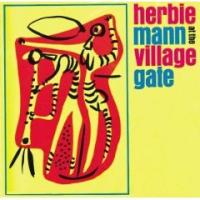Herbie Goes Bananas
You could accuse Herbie Mann (Herbert James Solomon) of “selling out” his serious jazz career for pop music stardom but that wouldn’t be fair.
The late Brooklyn born flautist managed to maintain credibility and respect on both sides of his long musical career, though the hit album Push Push’s naked upper torso cover was clearly a “jump the shark” moment.
Mann, who collaborated with Bill Evans, Antonio Carlos Jobim and many other jazz luminaries, aggressively worked the commerce side of his career early on. Back in 1961 and recently signed to Atlantic Records, Mann supported the release of his album The Family of Mann by doing in-store appearancesincluding one at a May’s department store on Union Turnpike in Queens that I accidentally bumped into.
I was 14 years old and often took the Q44 bus down Union Turnpike to the store to buy LPs. The “low rent” retailer didn’t have a big LP selection but it was close, convenient and discounted.
Back in 1961 everyone sold vinyl, which was then just going “mainstream.” You could get records at sporting goods stores like Davega, at Woolworths and at appliance and music instruction stores.
So there was this bearded young hipster standing at a table with a stack of The Family of Mann (Atlantic SD 1371) albums, not, as I remember it, in the record section, but by the front door of this totally un-hip shmatta emporium, waiting to autograph copies. There was a guy with Herbie, who I now take it was the under assistant east coast promo man.
You can just imagine someone at Atlantic twisting Herbie’s arm to appear at this obscure Queens department store on a weekday afternoon. I bet Herbie didn’t sell many records that afternoon, but as a fourteen year old just beginning to take an interest in jazz and seeing all the cool, exotic flutes on the cover and more importantly, being in the presence of a real, live jazz musician (for the first time) with an album on Atlantic, a label that released the Modern Jazz Quartet, then and now one of my favorites, I bought a copyprobably the only copy sold that day. Herbie autographed it and I still have and enjoy listening to the eclectic, tidily arranged album to this day.
At the time I didn’t know who engineer Phil Ramone was but I did know a fine sounding recording when I heard one. The album is an eclectic mix of tunes arranged with a heavy percussive accent, including Charlie Parker’s “Au Privave,” and Bobby Timmons’ now classic “Moanin’.”
Later in 1961, Atlantic released this recording of Mann playing at New York’s Village Gate. It became an extremely popular record that served as a good will ambassador for jazz to the general population. This no doubt pleased Mann who was quote on The Family of Mann saying “I’d much rather play for 20,000 persons than for 20.”
Backed by a percussive-rich ensemble, the emphasis was on catchy tunes and atmospheric, repetitive arrangements. The simmering set covers Ben Tucker’s familiar “Comin’ Home Baby” and two “Porgy and Bess” standards: “Summertime” and “It Ain’t Necessarily So.”
“Comin’ Home Baby” is a cool slither of a tune arranged for a low simmer and featuring two bassists, one of whom is the composer, while the take of “Summertime” is more fiery. Side two consists of an almost twenty minute jazz departure of “It Ain’t Necessarily So,” performed with African and Middle Eastern accents, heavy accent on the percussion throughout.
This is a toe-tapper of a hard-grooved album that clearly pleased the crowd that night and tens of thousands of record buyers back in 1961, who locked onto the hot percussive groove below and Mann’s cool, breathy melodic lines above. It was irresistible then and remains so now, though for some reason no one’s chosen to reissue this set on vinyl until now.
Audio Fidelity had Steve Hoffman and Kevin Gray cut from the original master tape and the result is outstanding as is the Rainbo 180 gram pressing. The plant has upped its quality over the past year and is now fully competitive with other audiophile-quality pressing plants.
The Tom Dowd and Phil Iehle recording is rich with atmospherics that produce great soundstage width and depth as well as natural sounding, three dimensional instrumental images.
Commercial? Perhaps. But Herbie Mann at The Village Gate is both a crowd pleaser and an album of sufficient substance to properly be labeled “a classic.” It’s as much fun to listen to now as it was back in 1961. Highly recommended.
- Log in or register to post comments




